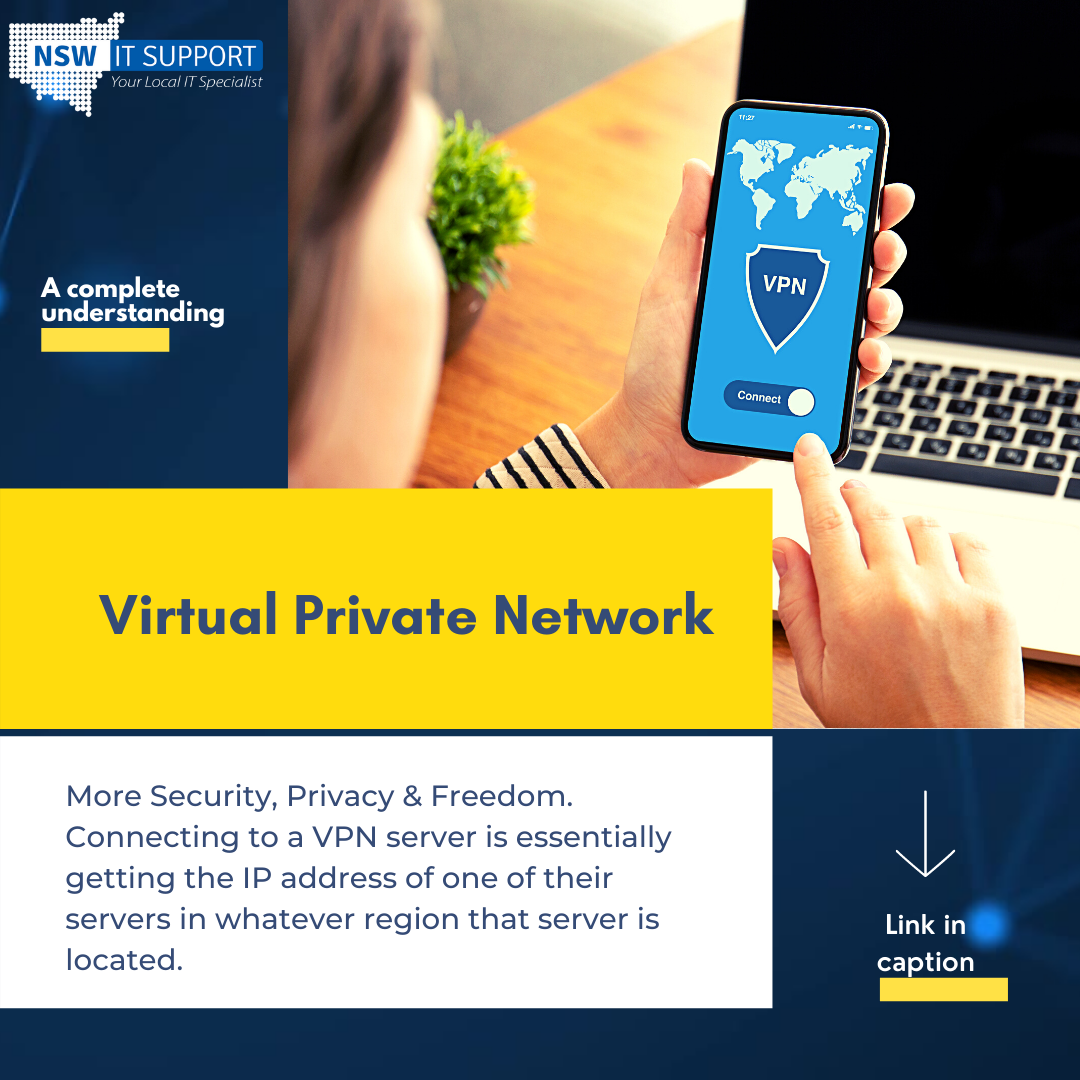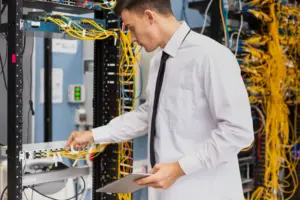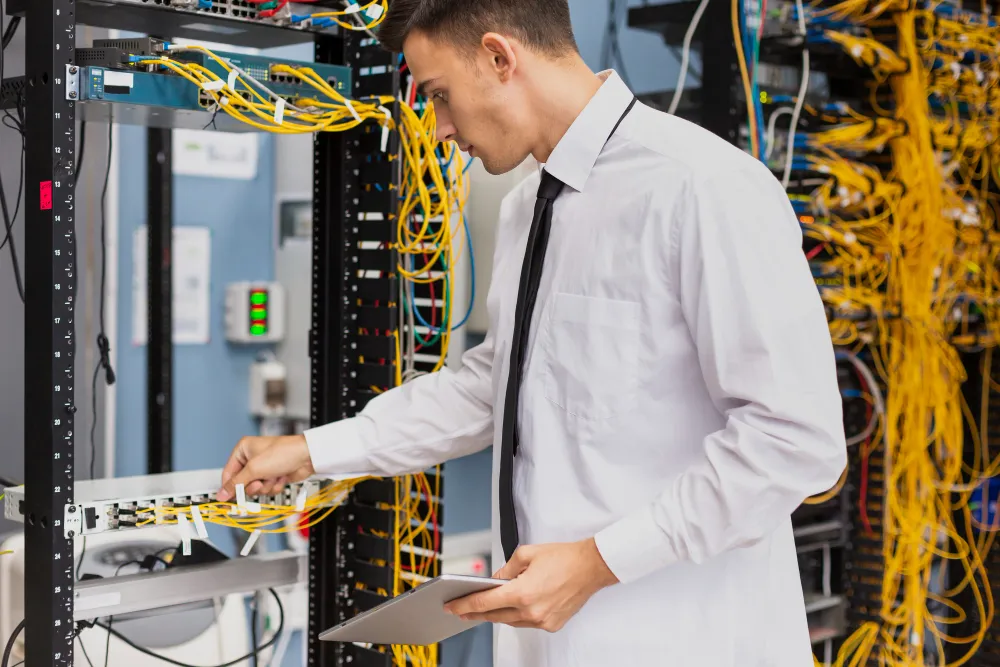Security and privacy on the Internet platforms are essential, and a VPN, or virtual private network, is the easiest way to ensure your data is safe and secure. How is it possible to be so interested in internet privacy in the first place?
So, here is the answer to every raised question as an increasing number of individuals use a VPN while browsing the web. VPN stands for Virtual Private Network. It’s a simple and efficient solution that offers you three essential things once you go online: more security, privacy, and freedom. Connecting to a VPN server is essentially getting the IP address of one of their servers in whatever region that server is located. The IP address of your VPN provider will only be visible to snoopers. Nevertheless, the information doesn’t seem to be complete.
Here, you have to read this article that explains everything about VPNs and why people use VPN networks.
What Is a VPN (Virtual Private Network)?
The VPN is a service that secures your Internet connection and gives you a greater sense of control over how your online activities are tracked. With a VPN, you get a combination of security (protecting your computer and data) as well as privacy (protecting your identity). Your computer and a VPN server negotiate an encrypted connection with a VPN, which generates a secure network between them. By connecting to a VPN proxy server, all of your network traffic passes through the tunnel, so no one other than your ISP, school, employer, parents, and the person sharing the wifi with you at a restaurant or anywhere can see what you’re doing.
VPNs can be classified into the following categories:
An administrator has several options when it comes to setting up a VPN. Among them are:
- Remote access VPN:
Connecting remote access servers to an organisation’s network is accomplished using a VPN gateway server. When connecting to an internal network resource, the gateway verifies the device’s uniqueness. Secure Sockets Layer (SSL) or IP Security (IPsec) is usually used to secure connections.
- A VPN that connects two sites:
An organisational VPN connects two networks that use a gateway device to attach a whole network at one location to another at a different location. The gateway handles the connection between the end-node devices at the remote location, so they do not need VPN clients. Protocols such as IPsec are commonly used on site-to-site VPNs. In addition, they often use carrier MPLS clouds rather than the public Internet to transport VPN connections between two sites. Here, too, it’s possible to possess either Layer 3 connectivity (MPLS IP VPN) or Layer 2 (virtual private LAN service) running across the platform.
- Mobile VPN:
Mobile VPNs still have the server at the back of the network, allowing clients to securely tunnel through it, providing tunnelled access to the corporate network. The VPN tunnels on mobile devices are not based on physical IP addresses, however. An IP address is assigned to every tunnel instead. Any mobile device connected to the Internet has the same logical IP address, no matter where it roams. In an efficient mobile VPN, users receive continuous service and switch between access technologies and multiple public and personal networks.
- Hardware VPN:
Hardware-based VPNs offer many advantages over software-only VPNs. A hardware VPN also provides load balancing for giant client loads in addition to enhanced security. Through the administration interface, users can access information through an internet browser. Using hardware VPNs is more expensive than using software-based VPNs. A hardware VPN tends to be favoured by larger companies because of its value.
- VPN appliance:
VPN appliances, also known as VPN gateway appliances, are network devices with enhanced security capabilities. SSL (Secure Socket Layer) VPN appliances are routers that protect, authorise, authenticate, and encrypt VPN traffic.
- Dynamic multipoint virtual private network (DMVPN):
DMVPN (a dynamic multipoint virtual private network) exchanges data between sites without requiring a VPN server or router at the head office. DMVPNs create a mesh VPN service that runs on VPN routers and firewall concentrators. Remote areas are equipped with routers connected to the company’s primary device (hub), providing access to the company’s resources. A spoke must contact a corner to acquire information about the opposite end and create a dynamic IPsec VPN tunnel that will transmit data directly between them in the case of a VoIP call, for instance.
- VPN Reconnect:
With VPN Reconnect, you can keep your virtual private network connection open even when the Internet service is unavailable for a short period. When a computer with a VPN connection drops its Internet connection, the top user usually reconnects manually. Connecting and reconnecting keeps your tunnel open for the duration you specify. The VPN connection is automatically restored as soon as Internet service is restored. Mobile employees can take advantage of this feature to make their work more efficient.
VPN services: how do they work?
You can protect your data by using a VPN in the following way:
- As soon as you connect to the Internet with your VPN on, you’ll automatically connect to at least one server of the VPN provider.
- At an equivalent time, they’re going to give you the IP address (a collection of unique numbers that serve as your device’s identification number) of that specific server. Instead of using your IP address, you use one that belongs to the VPN provider.
- The connection between your device and the server to which you are connected is additionally encrypted (converting data into code to thwart unauthorised access).
- Hiding your IP address allows you to access the web privately and helps to stop your browsing from being tracked or traced. You’re then ready to surf the online privately and securely.
Are there different types of VPN protocols?
Tunnelling, or encrypted connections, are used by VPNs. The VPN connection gets detected in several protocols by using measures so that your data will remain safe and secure from unauthorised access. Protocols that are the most widely adopted include:
VPN protocol OpenVPN is one of the most commonly used protocols. OpenSSL, SSLv3 and TLSv1 support encryption in this open-source protocol. A wide range of VPN providers offers OpenVPN services, which are used on multiple platforms (e.g. Windows, Mac (OSX), Android, iOS, Linux, and routers). There is no doubt that OpenVPN is the most straightforward option.
- IPSec/L2TP: This protocol combines IPsec for encrypting data with L2TP for establishing a secure connection. The majority of operating systems include IPsec/L2TP, which can serve as a good alternative if OpenVPN is unavailable.
- IKEv2: IPSec may support IKEv2. Fast connections to and switching between networks are possible with this protocol. Because smartphones modify public networks and Wi-Fi networks regularly, it’s the perfect choice for smartphones. The speed of IKEv2 is greater than that of OpenVPN, according to some sources. Despite this, OpenVPN has seen it as a result of its better protocols.
- PPTP: It is a commonly used protocol. It is also known as PPTP (Point-to-Point Tunnelling Protocol). There are a few (potential) leaks in this protocol. Thus, its use is only recommended for those whose priority is speed over safety. In some cases, stream services may impose restrictions; this is usually the case when you wish to bypass them.
- Softether: While all the protocols discussed thus far are standalone protocols, Softether is an open-source application that supports VPN protocols such as Secure Sockets Layer VPN, L2TP/IPsec, Open VPN, and Microsoft Secure Socket Tunneling Protocol.
- WireGuard: There is a relatively new protocol known as WireGuard that has become increasingly popular. It runs on a Linux kernel and is aimed at outperforming OpenVPN and IPsec.
The use of a VPN has many advantages, but what are those benefits?
You expose your private information and browsing habits when you surf the Internet or transact on an unsecured Wi-Fi network. Therefore, a virtual private network, or VPN, should be a requirement for anyone concerned about their online security and privacy. Imagine all the time you’ve spent on the go reading emails while waiting in line at the cafe or checking your bank account while waiting at the doctor’s office.
Unless you self-logged into your Wi-Fi network that requires a password, the data transmitted during your online session is vulnerable to being spied upon by strangers using an equivalent network. Your online activities, such as shopping, sending emails, or paying bills, are protected and secured by the encryption and anonymity provided by this software by keeping your identity anonymous.
VPNs: How Do They Work?
Online ventures have become the most reliable part of our lives. Checking our medical records, banking, keeping in touch with friends, and working online are all done electronically. There must be more to you than just the road you drive. As you know, you don’t simply leave your bank invoices lying around. Let’s say you do not secure your internet connection. As a result, you are in danger of hackers, government agencies, websites, your employer, and everyone else finding out more about you than you prefer. Your data is protected from these glimpses with a VPN.
Many reasons exist for why people want to start making use of a VPN. In summary, it improves your online privacy, increases your sense of security on the Internet, and gives you more control of your browsing experience.
Here are some common uses for VPNs:
Despite being a pretty simple tool, VPNs offer the following benefits:
Access a Commercial Network During Travel: Commercial travellers regularly connect VPNs to access their commercial network, including all their local network sources. As a result, the local resources do not need to be exposed to the web, which increases security.
Using a home network while travelling: In addition, you’ll find a VPN so you can access your home network while you’re away. Using it, you may be able to access Windows Remote Desktop over the web, use local file shares, and play games over the web as if you were on a LAN (local area network).
- Protect Your Internet Browsing Activity: When using a public Wi-Fi connection, the sites you visit besides HTTPS can be seen by anyone nearby if they have the skills to detect them. With a VPN, you can hide your browsing activity and protect your privacy. Through the VPN connection, all the traffic gets placed on the virtual network. The VPN will bypass connection monitoring by your Internet service provider, but keep in mind that VPN providers may prefer to log the traffic on their end.
- Access Geo-Blocked Websites: Whether you are an American wishing to access Netflix while travelling out of the country or abroad or desiring to use American media sites like Netflix, Pandora, and Hulu, you can still do so by setting up a VPN that is located within the United States.
Bypass Internet Censorship: Obtain access to the entire Internet by circumventing the Great Firewall of China. Many Chinese people use VPNs to bypass internet censorship. A firewall has interfered with VPNs (however, the excellent firewall recently did not allow VPNs to function, unlike before.)
Downloading Files: BitTorrent is used by many of us to download files using VPN connections. Even if you’re downloading legal torrents, you will still need a VPN for BitTorrent to advance faster speeds. If your ISP throttles and slows down BitTorrent, you’ll need a VPN to speed up BitTorrent. Your ISP may also interfere with other kinds of traffic (unless they interfere with VPN-specific traffic.)
VPN use- legal or illegal?
Many people wonder if it’s legal to use a VPN. The service permits you to become more anonymous online, which may be pretty valuable for hackers and online criminals. Since do not get traced online, it is much harder to punish them for their crimes. Nonetheless, this does not mean VPNs are illegal. On the contrary, many companies and businesses recommend using VPNs and use them themselves.
In many countries, VPN usage is legal. However, using a VPN to conduct illegal activities remains illegal. Therefore, using a VPN for legal actions such as browsing, gaming, Netflix, and YouTube isn’t problematic. Using a VPN, you could obtain illegal files such as unofficial copies of films or music. VPN gives you more online anonymity and makes it harder for officials to trace you down, so few countries consider the use of VPN illegal. Hence use a VPN for legal activities such as unblocking restricted YouTube videos. Stay away from illegal activities.










